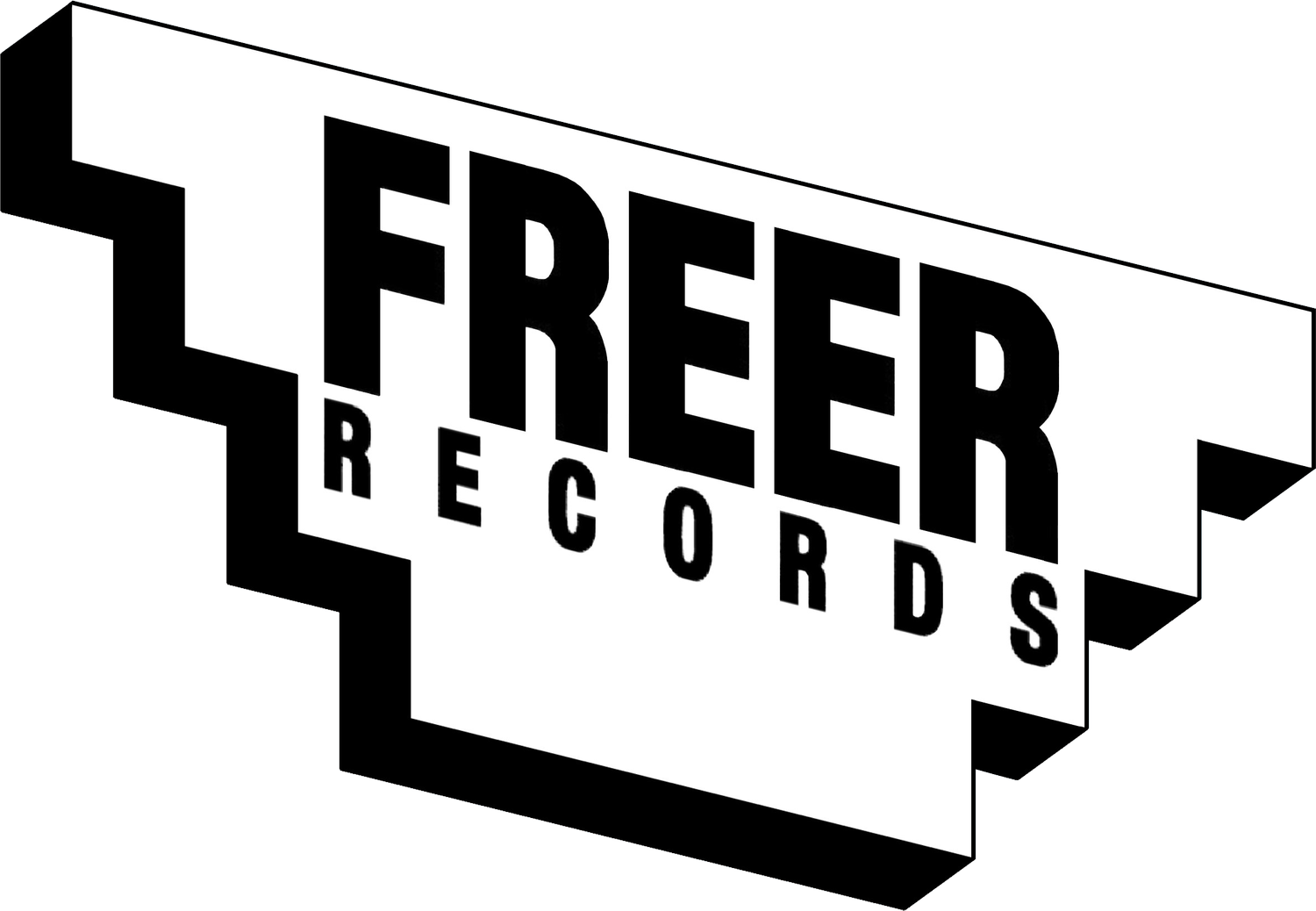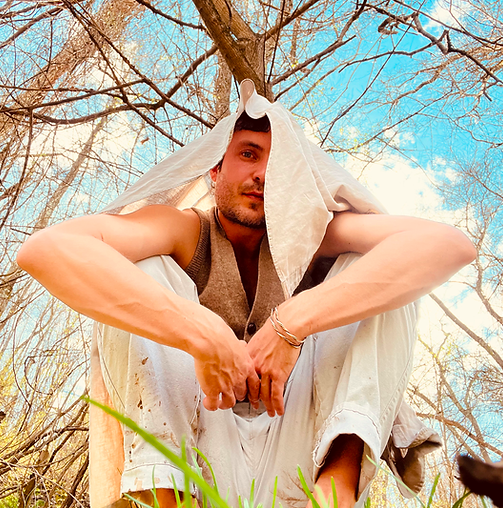Prison Blues & Poetry: An interview with Nicolas Snyder
by Royal Young
Composer and filmmaker Nicolas Snyder, who worked with poet Spoon Jackson on his record No Moon
“I am almost positive prison saved his life,” says composer and filmmaker Nicolas Snyder about his father.
We are speaking on how Nicolas came to be involved in internationally acclaimed prison poet Spoon Jackson’s record No Moon, which will be out from FREER Records this April.
Poet Spoon Jackson was born in Barstow, California in 1957, into a family of fifteen boys. He spent his youth in the wide-open landscape of the desert. At twenty years-old, Spoon was sentenced to life without possibility of parole.
Nicolas Snyder, a musician and artist born in rural Pennsylvania in the 1980s, had moved to California as an adult, away from a complex family life back East. When Snyder was 35, his father, an alcoholic Blues musician, was sentenced to two years in prison.
“Not necessarily that the way prison is set up saved his life, I don’t know how much rehabilitation and retribution there was in there,” Snyder shares. “But just in the fact that he wasn’t able to drink. We started talking on the phone once a week, or a couple times a week, and our relationship kind of repaired.”
When FREER Records put out a call for outside artists interested in collaborating with folks inside, Snyder was both intrigued and empathic. His father had told him first-hand how much access to music improved his time in prison, and Snyder was eager to explore the creative and healing human-relationship aspects of an exchange.
In the fall of 2020, Snyder began speaking to Spoon Jackson, one of the first creative contributors to the Die Jim Crow / FREER Records project, contributing poetry, lyrics and visual art since 2014.
“We spent the next two years getting to know each other and throughout that time I recorded Spoon reciting over 20 poems, which turned 14 into songs.” Says Snyder. “The quality of the recordings, through a prison phone and then recorded onto an app in my phone, was very lo-fi so I leaned further into that, a bit like the quality of Alan Lomax’s “Negro Prison Songs from the Mississippi State Penitentiary,” where you seemingly hear the pain echoing through the cold concrete walls. I wanted to create a similar kind of atmosphere.”
The resulting record No Moon is a testament to the endless freedom of imagination, even from behind prison walls. Featuring Native American flute played by Spoon on songs “Turning Point” and “No Moon,” as well as Jackson’s visionary recited poetry, the album is a profound musical journey which recalls the works of fiery prophetic poets throughout history such as Allen Ginsberg and Langston Hughes.
We spoke with Snyder about this deeply personal musical journey.
ROYAL YOUNG: One thing that fascinated me the most was your experience with your father, and how that brought you to this project.
NICOLAS SNYDER: My dad went to prison in 2018, and he was in there for two years. My whole life he was getting DUIs for driving without a license and things like that. He’s an alcoholic and just pushed the boundaries on that way too many times. He got a DUI in one county in Western Pennsylvania and then two weeks later got another in another county. He showed up to his hearing wearing an ankle bracelet from the previous hearing, and the judge just threw the book at him.
It was kind of a nightmare scenario. I think he expected to go to prison, but he didn’t expect two years. I remember his friend calling me to say he had dropped my dad off at his hearing, and waiting to hear back on when I could pick him up, and I never heard from him.
ROYAL: How old were you at this time?
NICOLAS: I was an adult, about 35. I lived on the other side of the country. Prior to that, he had essentially been drinking himself to death Leaving Las Vegas style. I think because he knew he was in so much trouble, it was just too much for him to bear.
It was a long, stressful process to even figure out where he was. When you go to prison, you don’t go immediately to the place you’re going to be the entire time, you get bounced around from a County Jail to then a central State hub, then they take you to your prison. So it was about two months of just trying to find where he was.
He’s a Blues pianist. It’s the only job he’s ever had in my lifetime, and that comes along with the sort of Blues stereotype of living hard. But he used to do prison tours. He would tour the entire state of Pennsylvania with his Blues band in the early 1990’s, I think a couple years in a row. So he actually had toured the prison where he ended up being.
ROYAL: There’s definitely a Blues song somewhere in there.
NICOLAS: [laughs] Oh, he wrote a whole album in prison.
ROYAL: Oh amazing, of course he did.
NICOLAS: I didn’t necessarily want to be involved with that.
ROYAL: At the time of his incarceration was your relationship good, or do you feel like it got better when he went away?
NICOLAS: Honestly, it got better when he went away. Because he had really been drinking himself to death, I hadn’t really been talking to him for a few years leading up to that.
By the time I was able to go visit him in prison, the way that he looked was years younger. It’s not like he was eating healthy in there, and smoking cigarettes non-stop, but it was just the fact that he had stopped drinking. It gave him years back to his life. To the point where I am almost positive that prison saved his life.
Not necessarily that the way prison is set up saved his life, I don’t know how much rehabilitation and retribution there was in there, but just in the fact that he wasn’t able to drink. But we started talking on the phone once a week, or a couple times a week, and our relationship kind of repaired.
So whenever Fury posted that he was looking for artists to work with people who had recently been incarcerated, I was like well I have JPay systems and I have an account. Because if you don’t, there are hoops you have to jump through.
Spoon Jackson and Nicolas Snyder’s song “Computer Lady” (cover above) tackles the surveillance state through music.
ROYAL: Yeah, there are purposeful barriers to communicating with people inside.
NICOLAS: Yeah, so after learning from my dad what was really going on inside, I had gained a lot more sympathy for someone in that situation, and I thought that would be a beautiful thing to do, to collaborate with someone inside.
ROYAL: And you didn’t want to work on your dad’s record, so you found someone else? [laughs]
NICOLAS: [laughs] Yeah, that was just a little too close to home.
ROYAL: I think that is such a profound connection, and I think it really comes through in the landscape you built up around Spoon’s words. There is a real depth of personhood and story that you feel in the soundscape.
NICOLAS: Thank you, honestly it was easy.
ROYAL: It flowed.
NICOLAS: Yeah, because his words are so beautifully simple and cut to the core of what he is feeling. It was easy to build off that. I could feel a shadow of what he was feeling, and find the musical colors to paint around his words.
ROYAL: I love that you use the words colors and paint, because the word visual kept coming to mind. I’m curious if your work in film, and a visual or cinematic element informed that. It was very powerful to see words from someone who is essentially locked in a box, yet the world they are building in that box feels so expansive, limitless, and real, which I think it is all those things. So that really comes through.
NICOLAS: Yeah, I think that was one of the funnest aspects of the project, was to amplify the fantasy of his words. And there are just as many poems that are plain-spoken about the injustice of his situation, or his regrets. But I really enjoyed his romance poems, and weird apocalyptic visions.
ROYAL: What is it like being a bridge for someone in a sense between two worlds?
NICOLAS: It’s weird. For one, so much of the relationship has this kind of built in boundaries and terms. For instance, Spoon could only hear what I was working on from my holding my phone up to my speakers. So there’s a bit of guesswork I have to do, and feel in to what would feel right to him. Towards the end of the process it got a little easier, they allowed residents to have little iPad type things.
ROYAL: Little government tablets.
NICOLAS: Yeah, so I could send him music and videos through that, but it could only be 30 seconds long. So it got more collaborative as we went on.
ROYAL: Well, I think the nature of the collaboration changes, and opens up for the better. But interestingly, I think part of the creative process and listening to the record. Part of listening to the art of someone who has experienced prison, or experienced anything that you haven’t, is getting to experience it through them.
NICOLAS: There was an experience that happened with my dad when he was in prison. We used to go into this big meeting room that had a lot of people visiting with their families, and there were vending machines where you could buy snacks and stuff. But this one time, something happened and we could only meet in this basically isolation room with this big pane of glass and little tiny microphone speaker system probably installed in 1952. It was just the most archaic technology. I could barely hear what my dad was saying. And in some ways, that was like what making this album was like.
There wasn’t an option of me driving up to Solano and recording Spoon in person. I think that’s a big thing for people to know, we weren’t granted access to go in there with a microphone. This all happened through a prison phone. There was this mass obstruction, and we could only communicate through this tiny little crack. I think there’s something really beautiful about that.
ROYAL: Definitely, and you were able to make that part of the experience. Owning those imperfections or roadblocks and making them shine.
NICOLAS: I always think of those things as an artifact of the process. You don’t hide the constructions, sometimes that is what makes the end piece more interesting.


